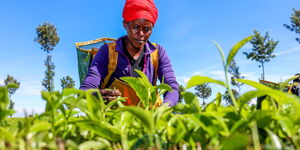The European Union has urged Kenya to improve its business environment, citing graft, frequent legislative changes, and unfavourable taxes, even as it plans to intensify trade activities with the East African nation.
EU Ambassador to Kenya Henriette Geiger revealed this development while speaking to Bloomberg in the midst of an ongoing Economic Partnership Agreement (EPA) granting Kenya duty-free and quota-free access to the bloc.
“We’re working on the business climate and the investment climate, and that at the moment is not very favorable in Kenya,” Geiger said.
“Others are not sleeping. Tanzania, Rwanda and Uganda are catching up fast and are becoming more and more competitive, while Kenya is resting a bit on its laurels,” she added.
While drumming up support for the agreement, Geiger called for the reforms to ensure that the long-lasting impacts of the EPA could be felt in the country’s economy.
“What we have seen with other countries where EPAs were signed with the EU, they had incredible increases in trade volumes, in comparison to countries that didn’t have an EPA,” she opined.
At the same time, she stressed the need for greater collaboration amongst trading partners and championed a greater variety of Kenyan exports, which were mostly centred on agriculture.
“We need to make sure that the economic operators are putting their heads together and forming new alliances, looking at new business opportunities and also Kenya needs to diversify its exports,” Geiger expressed.
Trade between the two was €3.4 billion (Ksh 500B) in 2023, a 53 per cent increase over the past decade, according to EU data, making the region Kenya’s biggest trading partner that year.
Kenya exported €1.4 billion (Ksh 205B) to the EU in 2023 — mainly vegetables, fruits, and flowers — and imported €2 billion (Ksh 294B) worth of mineral and chemical products and machinery.
Kenya and the European Union signed the EPA in May 2024 at the State House in Nairobi, with the ceremony attended by the EU delegation in Kenya, led by Ambassador Geiger. During the ceremony, President William Ruto expressed his optimism about the agreement and highlighted its potential substantial benefits for the country.
The partnership, which was officially implemented on July 1, 2024, includes binding commitments on trade and sustainable development, encompassing climate and environmental protection, as well as labor rights, along with a transparent dispute resolution mechanism.
This makes it the most ambitious economic partnership agreement the EU has established with a developing country in terms of sustainability provisions.
The EPA between the EU and Kenya aims to implement provisions outlined in the EU-East African Community (EAC) Economic Partnership Agreement, and it will also be open for other EAC countries to join in the future.












